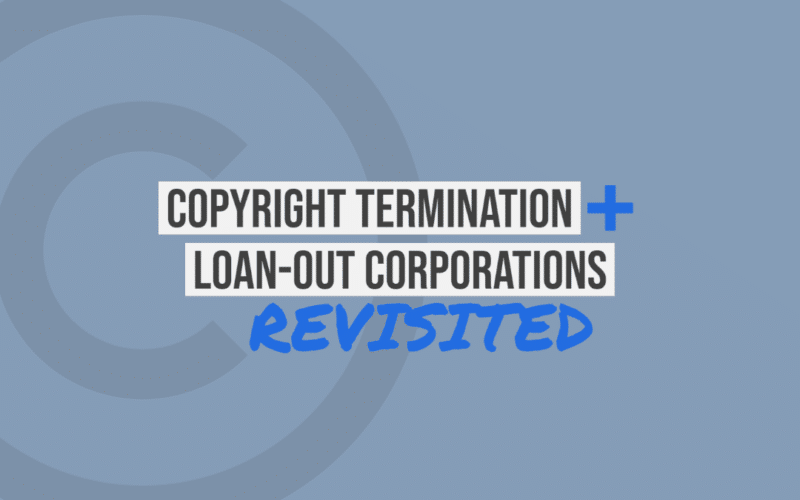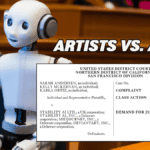How a common entertainment industry tax planning tool may prevent artists and their heirs from utilizing the Copyright Act’s termination provision.
A lot of articles have been written over the years about copyright termination, a provision of the Copyright Act that gives qualifying authors and their heirs a “second bite at the apple” to recapture previously-transferred copyrights once they’ve proven valuable.
Back in 2012, I co-authored one of these articles along with my colleague Ken Basin. (Ken is currently head of business affairs for Paramount Television Studios, which is a pretty decent step up from his previous gig as the guy who lost $475,000 on “Who Wants to be a Millionaire.”)
Our premise was fairly simple, although in typical law review fashion it took 166 footnotes to fully explain: As transfers of modern copyrighted works became eligible for termination, artists who created these works as the employees of so-called “loan-out corporations” could be unwittingly denied the ability to terminate their prior copyright transfers.
UPDATE—June 26, 2023—It’s finally happened. A major motion picture studio (Sony’s Columbia Pictures) has filed a lawsuit challenging the termination of a copyright assignment made by a writer’s loan-out company. Read all about it here.
The Interplay Between Copyright Termination and Loan-Out Companies
Loan-out companies are a legal fiction, albeit one that’s perfectly valid and incredibly common in the entertainment industry. Creative artists are “employed” by companies they own, with their services then “loaned out” to studios, record companies and other hiring parties. This gives artists a number of benefits, most of them involving favorable tax treatment. The downside is that if, as an artist, you create a copyrighted work as an employee—even of your own company—it will likely be deemed a “work made for hire” and your employer will be considered the legal “author” of the work. This normally isn’t a big deal, except when it comes to copyright termination, when it’s a huge deal. This is because transfers in works made for hire aren’t eligible for termination.
At the time we wrote our article (the rather clumsily-titled “Copyright Termination and Loan-Out Corporations: Reconciling Practice and Policy”), no copyrighted works created after January 1, 1978 had yet become eligible for statutory copyright termination. That first happened beginning in 2013, which was 35 years after the 1976 Copyright Act took effect. We predicted a wave of cases considering whether works created on behalf of loan-out companies were in fact ineligible for copyright termination.
Waite v. UMG Recordings, Inc.
Well, it took eight years, but it looks like it’s finally started to happen—sort of. The case at issue is a currently pending, highly contentious dispute in the Southern District of New York between 80’s rocker John Waite and record label Universal Music Group (UMG). Waite is best known for his 1984 hit “Missing You.” Last year, he filed a class action lawsuit on behalf of himself and other similarly-situated artists claiming that UMG had systematically ignored copyright termination notices, including his own.
UMG’s Motion to Dismiss
UMG filed a motion to dismiss the case, arguing that the termination notices served by Waite and other artists were invalid. UMG asserted that many of the copyright transfers at issue were not in fact made by the artist plaintiffs, but rather by their loan-out companies. Under the Copyright Act, only a grant “executed by the author” of a work is subject to termination. Because Waite wasn’t the one who granted rights in his songs to UMG’s predecessors, UMG argued, he couldn’t terminate the previous agreements.
You may be asking yourself, why couldn’t the loan-out companies terminate the transfers? The reason this doesn’t work is that under the Copyright Act’s termination provisions, only natural persons and their families may terminate a transfer. These were the individuals that termination was designed to benefit, as opposed to corporate entities. Of course, Congress didn’t foresee the widespread use of loan-out companies at the time it passed the Copyright Act.
Waite’s Opposition
Waite’s lawyers opposed UMG’s motion to dismiss, arguing that such issues as whether Waite was an employee of his loan-out companies and whether his songs were created as “works made for hire” raised questions of fact that couldn’t be determined prior to discovery. Waite also contended that discovery would be needed to determine whether his loan-out strategy was “merely a tax-planning device, without any intention to implicate termination rights.”
The Court’s Order
Ruling in favor of UMG on the loan-out issue, Judge Lewis Kaplan held that it was undisputed that Waite’s loan-out companies had executed the transfers of his sound recordings to UMG’s predecessors. Because Waite wasn’t the “grantor” of rights in the copyrighted works, he couldn’t terminate prior transfers of the works. As for Waite’s argument that his use of loan-out companies was simply a tax-planning device, the court held that it wasn’t proper to use a corporate structure for some purposes—e.g. taking advantage of tax benefits—but then disavowing it for other purposes.
The reason I noted earlier that the court only “sort of” dealt with the loan-out question was because its opinion didn’t address the issue of whether Waite and his loan-out companies had an employer-employee relationship or whether his sound-recordings were actually works made for hire. But in this case, such a determination wasn’t necessary. The problem for Waite was that his termination notice stated that he was the author of the copyrighted songs he sought to recapture, while his complaint conceded that he had entered into his recording agreements through his loan-out companies.
This effectively put Waite in a box: copyright termination must be effectuated by the author or the author’s heirs, i.e. living persons. But the grants that Waite sought to terminate were made by his corporate entities, leaving him without the ability to recapture rights in his sound recordings.
Artists Who Use Loan-Out Companies May Inadvertently Forfeit Copyright Termination Rights
On the larger, unaddressed issue: as we noted in our earlier article on copyright termination and loan-out corporations, most individuals who use loan-out companies are necessarily employees of those companies. That’s the whole point: in order to receive the favorable tax treatment loan-out companies can offer, there needs to be a legitimate exchange of services for appropriate compensation. Otherwise the IRS may think the strategy is one big tax evasion scam.
In fact, many artists enter into formal written “employment agreements” with their loan-outs in order to solidify the employer-employee relationship (and avoid the wrath of the IRS). Many of these agreements specifically provide that the results and proceeds of the artist’s services are deemed “works made for hire” on behalf of the corporation. But even without a formal agreement, works created by an employee within the course and scope of his or her employment are typically treated as works made for hire as a matter of law.
The very arrangement that artists use to make their loan-out corporations effective and legitimate also appears to effectively destroy copyright termination rights.
For artists wishing to retain both favorable tax treatment and statutory termination rights, the unfortunate truth is that the conditions that a loan-out must satisfy in order to withstand IRS scrutiny are the same factors that weigh in favor of an employment relationship for copyright purposes. The end result is that the very arrangement that artists use to make their loan-out corporations effective and legitimate also appears to effectively destroy copyright termination rights.
We discussed some potential work-arounds in our article, but concluded that the most viable solution would involve a legislative fix. But artists shouldn’t hold their breath. After all, if Congress can’t pass a stimulus bill in the middle of a pandemic-fueled recession, it’s not likely to tackle copyright termination any time soon.
As always, let me know your thoughts in the comments below or @copyrightlately on social media.







3 comments
Nice recap – thank you, Aaron!
🧐©️⚖️🚫💸
Thank you for reading!
Your article on the loan-out company issue has been a frequent reference for me.